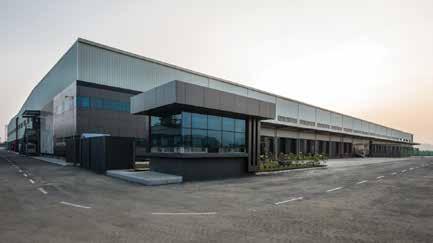
6 minute read
Abhijit Malk ani Co-CEO & Country Head
Abhijit Ma
lka ni
Advertisement
Real estate as an industry has been doing a lot of catching up on technology, and this crisis is making things develop even more quickly. After this situation is over, technologies which enable more efficient operation and communication will be an essential element of a good organisation.
Abhijit Mal kani, Co-CEO & Cou ntry He ad, ESR India
informs Upamanyu Borah, how data and analytics have proven to be a saviour for stakeholder interests and purposes and aided in retaining business continuity, and innovations that are set to change the way they transact business post-crisis.
How hard has the corona crisis hit the real estate industry? COVID-19 has hugely impacted the real estate sector, however industrial and logistics segment are perceived to be more resilient and is expected to recover faster post the pandemic.
Construction has resumed in most of our sites across the country, although deliveries will be delayed. There has been an inflow in demand and this cre ates a positive impact on recovery in the near future.
The real estate industry was in an over-supply state even before the lockdown. Have things gone worse now? We had noticed a steady demand for Grade A spaces even before the lock down, and the pandemic has pushed the demand for Grade A spaces even fur ther. Companies seem to be more eager to adopt automation to further increase their efficiency, consolidate their busi nesses and increase safety initiatives, along with supplementing contactless business processes. Additionally, Grade A spaces are more adaptive for such implementations.
How concerned are you over the continuing deceleration in the economy? Deceleration in economy has been a major concern across sectors. However, the pandemic has boosted e-commerce, cold storage, FMCG, and pharmaceutical businesses. This is poised to lead to an increase in warehouse absorption in the next three to four quarters. Any sort of new liabilities or challenges you have developeddue to adopting a decentralised work model? Has it affected your real estate portfolio? Being smart has always been a key positioning for ESR India. We launched the ‘ESR app’ during the pandemic to help us manage our parks digitally and follow contactless business processes. It has enhanced our portfolio and will help us deliver smart parks with increased safety and security measures, going forward.
Could you elaborate on the ESR India’s quality focus that permeates all its activities and functional areas? ESR India is here to deliver next-gen industrial and logistics spaces. Our spaces are smart, sustainable and human-cen tric, designed to enhance our park experience and productivity of the users. ESR parks are managed through the ESR app, the app is enabled with contactless visitor management, wayfinding to direct trucks to assigned docks, amenity bookings for clients to book common facilities, live

feed to view buildings from any location and digital service requests for repair and maintenance of any common ameni ties. The app is also connected with our AI based cameras to detect any anoma lies in the premises.
Sustainability is also at the core of our business. We believe sustainable spaces are not only good for the environ ment but also lead to bottom line savings for our clients. ESR India parks are In dian Green Building Council (IGBC) Silver rated. Sustainable elements such as solar, daylight integration, STP, exten sive green areas with draught resistant plants and responsible waste manage ment are key features to enhance productivity and reduce costs.
How are you extending stakeholder communication to embrace ecosystem partners that have become critical components of the business model? ESR India is an integrated business platform; our stakeholders are onboarded onto the ESR app to inform them about business progress. The live feed helps clients view real-time status. The app feed features updates from our sites, construction progresses, and other im portant information.
How can we lean on the ecosystem to improve the resilience of individual organisations during periods of disruption? This ecosystem has enabled a wide scale digital adoption across our parks and has provided contactless and safer park man agement and reduced human contact. This has created a safer environment for business continuity post the pandemic.
Do you anticipate a reconfiguration of the business model by real estate developers in the wake of COVIDinduced changes in the general mindset of individuals?
Faced with the disruption owing to COVID-19, developers might have to recalibrate their business models.
Labour will be an issue for the next two quarters and construction timelines will be delayed. However, incity warehousing spaces will be in de mand as there has been a marked increase in grocery formats, demand from e-commerce and FMCG, and for cold storage, which will remain robust. Be sides, as remote working continues, increase in demand for spaces for data centers is predicted.
We will also see an increase in joint ventures and outright sale by local de velopers to institutional developers as
Forward thinking approach sets up apart as a business. For instance, the ESR app which took months to develop, helped us promptly launch a work safe module to manage our parks digitally with enhanced safety measures.
availability of debt will be scarce. CO VID-19 has been a wake up call for digitally managed and contactless spaces and more developers would offer smart features. Facility Management will en sure the functionality, comfort, safety and efficiency of a built environment — buildings and grounds, infrastruc ture and real estate in real-time.
Does the crisis seem to offer some opportunities for new developments especially with regards to sustainability and digitalisation? Contactless and digitally managed spac

es will be in demand post the pandemic. Sustainability has been a key feature in modern developments, it reduces envi ronmental impact and helps increase productivity and cost efficiency. There are a lot of problems to solve around growth, but what do you think needs to happen to overcome the general growth challenges in the space against the background of post-COVID market uncertainties? Real estate sector will face a growth challenge in the coming months; however warehousing and industrial spaces can offer a silver lining. We believe there would be an increase in demand for spac es in tier II and III cities as e-commerce penetration has increased during the pandemic. There has also been a spike in global interest to invest in India and we should see an increase in demand for industrial spaces in the long term as com panies plan supply chain diversification. As a CEO, what are the roadblocks you see to navigate the ship in critical times like this one? It is important to create a positive environment and empower your workforce during a crisis. Forward thinking ap proach sets up apart as a business. For instance, the ESR app which took months to develop, helped us promptly launch a work safe module to manage our parks digitally with enhanced safe ty measures.
Finally, as new business models emerge from the crisis, can your organisation become the nexus of a new, emerging ecosystem that’s built for the ‘next normal’? There will be renewed interest in digitisation and automation, and ESR India has already digitised its parks to adapt to the 'new normal'. The rest will soon fall into its own rightful place in its own time.










